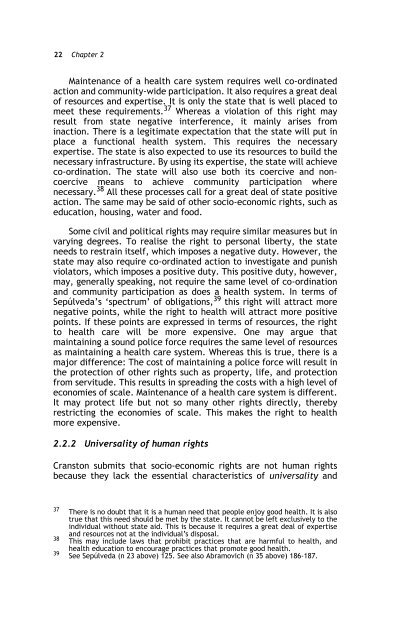LITIGATING SOCIO-ECONOMIC RIGHTS IN SOUTH AFRICA - PULP
LITIGATING SOCIO-ECONOMIC RIGHTS IN SOUTH AFRICA - PULP
LITIGATING SOCIO-ECONOMIC RIGHTS IN SOUTH AFRICA - PULP
Create successful ePaper yourself
Turn your PDF publications into a flip-book with our unique Google optimized e-Paper software.
22 Chapter 2<br />
Maintenance of a health care system requires well co-ordinated<br />
action and community-wide participation. It also requires a great deal<br />
of resources and expertise. It is only the state that is well placed to<br />
meet these requirements. 37 Whereas a violation of this right may<br />
result from state negative interference, it mainly arises from<br />
inaction. There is a legitimate expectation that the state will put in<br />
place a functional health system. This requires the necessary<br />
expertise. The state is also expected to use its resources to build the<br />
necessary infrastructure. By using its expertise, the state will achieve<br />
co-ordination. The state will also use both its coercive and noncoercive<br />
means to achieve community participation where<br />
necessary. 38 All these processes call for a great deal of state positive<br />
action. The same may be said of other socio-economic rights, such as<br />
education, housing, water and food.<br />
Some civil and political rights may require similar measures but in<br />
varying degrees. To realise the right to personal liberty, the state<br />
needs to restrain itself, which imposes a negative duty. However, the<br />
state may also require co-ordinated action to investigate and punish<br />
violators, which imposes a positive duty. This positive duty, however,<br />
may, generally speaking, not require the same level of co-ordination<br />
and community participation as does a health system. In terms of<br />
Sepúlveda’s ‘spectrum’ of obligations, 39 this right will attract more<br />
negative points, while the right to health will attract more positive<br />
points. If these points are expressed in terms of resources, the right<br />
to health care will be more expensive. One may argue that<br />
maintaining a sound police force requires the same level of resources<br />
as maintaining a health care system. Whereas this is true, there is a<br />
major difference: The cost of maintaining a police force will result in<br />
the protection of other rights such as property, life, and protection<br />
from servitude. This results in spreading the costs with a high level of<br />
economies of scale. Maintenance of a health care system is different.<br />
It may protect life but not so many other rights directly, thereby<br />
restricting the economies of scale. This makes the right to health<br />
more expensive.<br />
2.2.2 Universality of human rights<br />
Cranston submits that socio-economic rights are not human rights<br />
because they lack the essential characteristics of universality and<br />
37 There is no doubt that it is a human need that people enjoy good health. It is also<br />
true that this need should be met by the state. It cannot be left exclusively to the<br />
individual without state aid. This is because it requires a great deal of expertise<br />
and resources not at the individual’s disposal.<br />
38 This may include laws that prohibit practices that are harmful to health, and<br />
health education to encourage practices that promote good health.<br />
39 See Sepúlveda (n 23 above) 125. See also Abramovich (n 35 above) 186-187.
















